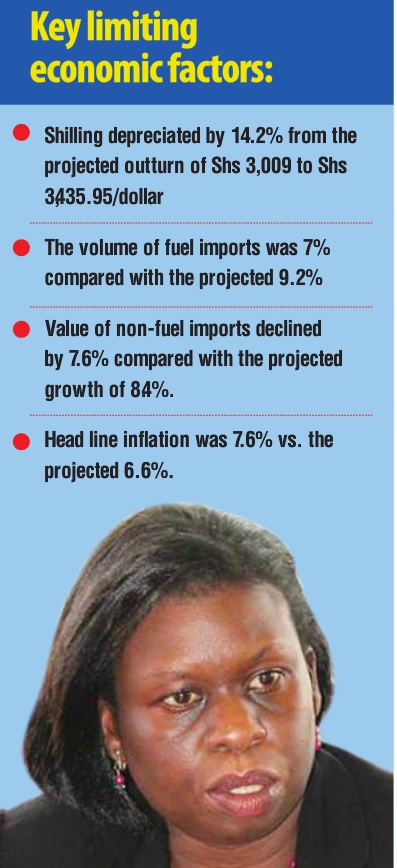
Fred Muhumuza, a financial economist, told The Independent that it is difficult for URA to achieve target citing government’s failure to revive the economy, demonstrated with its involvement in high treasury bills and bonds, and consequently leading to high interest rates that now average 24.5% thus discouraging investment.
“Looking at the prevailing conditions in the country, she (Akol) cannot hit the target no matter how hard she tries because she is not going to tax goods that I and you have not consumed,” Muhumuza says.
“URA normally collects taxes based on what is happening in the economy; they cannot manufacture money…and so every time people are not consuming goods and services as it is at the moment or a company collapses, URA loses revenue automatically.”
He added that even the income tax that URA is targeting like Pay-As-You –Earn (PAYE) is now unpredictable as people are losing jobs because companies are distressed, scaling down their operations.
The government is reportedly planning to fork out about Shs 1.3 trillion in a bailout plan that will see more than 65 cash-strapped companies, including the Alam Group – owned Steel Rolling Mills, a move that has so far elicited mixed reactions from the economic analysts and the public.
Reacting to the new URA target, the private sector revealed that the new target signals a tough business environment ahead as URA desperately looks for more revenue to fund the ever increasing government expenditure.
“The challenge we have at the moment is that we have a government that is setting very high targets for the taxman and at the same time its recurrent expenditure is also very high,” Gideon Badagawa, the executive director at the Private Sector Foundation Uganda (PSFU) told The Independent.
“This has forced URA to look for all means of collecting revenue including closing down businesses to meet the government demands even when the micro-economic conditions in the country aren’t conducive for businesses.”
Badagawa’s reaction is response to the recent closure of various businesses by the URA as it intensified its crackdown on tax non-compliant tax payers.
On July 19, URA closed Nakivubo Stadium over unpaid taxes, amounting to Shs 484million, which had accumulated since 2013. This followed the suspension of 22 clearing and forwarding firms indefinitely in June due to their alleged involvement in fraudulent clearance of vehicles.
In April, a renowned city businessman Gordon Wavamunno lost management of his WBS television station after being placed under receivership to recover Shs 7.2 billion in accumulated tax arrears for more than ten years.
Badagawa said a favorable revenue collection regime is supposed to improve and widen the tax base; encourage investments, creates jobs, and businesses makes profits, a scenario he says is yet to be seen in the country.
He says the high interest rates have rendered business unprofitable, as exemplified with commercial banks recent threats to sell companies’ assets to recover their loans.
Going forward, Francis Kamulegeya, the PricewaterhouseCoopers senior partner, said the government, consumers, and investors should be optimistic about the economy in spite of the current bumpy ride.
“I think it is very important to take things into the perspective. We have to be careful. There has been a lot going around about the state of the economy including bailouts for some companies but the fundamentals have not changed from a macro-economic stability, focus on low inflation, affordable interest rates, and growth in the economy,” he said.
He added that whatever is happening at the moment is because of both local, regional and global economic shocks but the country is not in recession, though growing at a slower pace than we would want it to be. “It is very important that we remain upbeat and positive otherwise if we continue as if everything is doom and gloom, then we may take ourselves into that situation,” he said.
Another positive he added is that the government has come out strongly and focus on the productive sectors of the economy particularly agriculture, manufacturing, tourism, he believes that the new direction will rejuvenate the economy.
But he called for the right for the right policies to ensure consumer confidence so that people can go out and spend some money on goods and services,
For 2016/2017, the government has handed URA a target of Shs 13.2 trillion, and Akol was confident that they will hit the target come June next year given that they have devised a number of strategies to ensure that it surpasses that target. “We plan to offer personalised taxpayer services by consulting and deeply involving taxpayers in the designing of our processes, systems and products, “she said.
“This will ensure that services are based on a deeper understanding of the entire taxpayer experience and that the compliance burden on taxpayers to meet their obligations is reduced.”
She also said they plan to implement specific and targeted taxpayer engagement programs as they also seek to interface public and private sector through information communication technology enabling the taxman access rapid, real-time data sharing, consequently reducing the information burden on the taxpayer and increase in tax compliance levels. Also, the tax body targets to close leakages in the tax system especially through cracking down on high profile taxpayers that have an international dimension.
However, Muhumuza said the government should keep revising the revenue target so that at the end of the day, URA achieves a target that is as close as the reality.
Currently Uganda has about 923,000 tax payers as at June 30, up from 783,100 in the previous year.
 The Independent Uganda: You get the Truth we Pay the Price
The Independent Uganda: You get the Truth we Pay the Price


